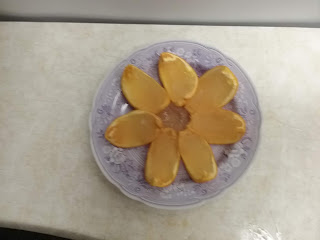The Challenge: Fear Factor. Try something a little scary--an intimidating recipe, a new technique or a 'spooky' food.
A friend of mine makes gorgeous jelly-filled orange slices from Francatelli's recipe. I decided to try them for this challenge, since presentation is one of my major weaknesses.
The Recipe: Oranges Filled with Transparent Jelly (#1429) and Maraschino Jelly (#1424) from The Modern Cook (1846) by Charles Elme Francatelli
MARASCHINO JELLY. To one pint of clarified syrup, add two ounces of clarified isinglass, the filtered juice of two lemons, and a gill and a half of genuine maraschino; pour this into a jelly mould ready set in rough ice.
ORANGES FILLED WITH TRANSPARENT JELLY. Select half a dozen oranges without specks on the rind; make a hole at the stalk end with a circular tin cutter about half an inch in diameter, and then use a small teaspoon to remove all the pulp and loose pith from the interior; when this is effected soak the oranges in cold water for about an hour, then introduce the spoon through the aperture and scrape the insides smooth and after rinsing them again in cold water set them to drain on a cloth. Next stop up any holes that may have been made in them while scooping out the pulp and set the oranges in some pounded rough ice contained in a deep saucepan; fill three of them with bright pink orange jelly and the remainder with plain jelly. When the jelly has become firm wipe the oranges with a clean cloth cut each into four quarters dish them up tastefully on an ornamental pastry stand or upon a napkin and send to table.
The Date/Year and Region: 1846, London
How Did You Make It:
First I prepared the oranges by punching a hole over the stem. I used a large round decorating tip (Wilton 2A, just a 1/2" diameter circle) for want of a tin punch the same size. It worked well to remove the stem edge. Unfortunately, I do not possess a spoon less than 1/2" wide with which to scrape the inside of the oranges, and instead ended up improvising with a 1/2 teaspoon measure and a butter knife. My finger ended up being more effect than either of those (no one else is eating this batch, so it's less of a problem, but will need to be solved if I ever make these for others).
 |
| Step 1: Stab an orange. |
 |
| Step 2: Eviscerate the orange. |
 |
| Step 3: Mix jelly. |
Once the oranges had soaked an hour, I gave them a final scrape, then set them on ice (attempting to put together the torn edges--this worked well enough that I didn't try mending them with flour paste, which was my next idea for how to 'stop any holes'. I hen prepared the jelly by juicing two lemons, and adding the strained juice to 3/4 cup maraschino liquor, 1 pint of the prepared syrup, and 4 packets of gelatin (substituting 1 packet gelatin for 1/2 oz isinglass). Mixed this up, and got a transparent, almost colorless liquid. I poured it into the oranges, and set the bowl in the refrigerator to encourage faster setting. The jelly was mostly set in just over 2 hours.
 |
| Final: Orange slices that are actually alcoholic gelatin. |
Time to Complete: Didn't time the initial orange preparation; clarifying the syrup took about 25 minutes (done during the hour the oranges were soaking), preparing the jelly and finishing the oranges took about half an hour. The jelly set in 2-ish hours, but I think more time would have been useful.
Total Cost: $2 for two oranges, other ingredients on hand.
How Successful Was It?: I need some practice, but the jelly set well enough to cut the orange slices, so I'm not complaining. I need to figure out a better way of cleaning out the oranges and to practice a bit more before making this recipe for others.
The jelly tastes like maraschino, with the lemon not really coming through. Tasty enough, though I'd be tempted to try kirsch or one of the other options next time.
How Accurate Is It?: I substituted prepared gelatin for the isinglass; while the book does gives instructions for gelatin jellies, those start with boiling hooves. That was the main modern shortcut, with the use of a refrigerator as a second.

No comments:
Post a Comment
Thanks for commenting!